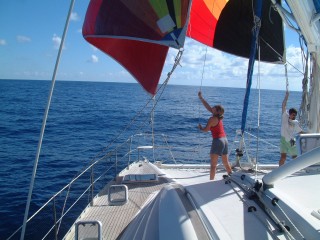
Dropping the chute -
we used it a lot in the light airs
|
Pacific Landfalls Fr. Polynesia Pages Related Pages |
FP Passage
 Dropping the chute - we used it a lot in the light airs |
Passage Statistics
Departure: Villamil, Isabela Island, Galapagos, 22 May 2003.
Arrival: Ua Huka, Marquesas, French Polynesia, 15 June 2003.
Passage: 2,935 nautical miles (5,436 km) in 24 days, 8 hours.
Average Speed: Just over 5 knots, pretty slow for us.
Average Wind and Sea Conditions: Pretty light from the SE for the most part, usually with
about 1 knot of current assistance.
You can also read the newsletters we sent by email from the boat while we were on this passage. They have a certain immediacy and reflect our up to the moment thoughts and feelings.
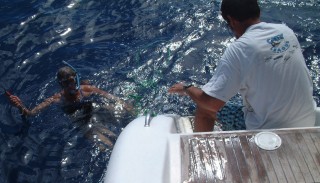 Mid-Pacific swim to clean off the goose-necked barnacles |
(Sue) This was the long-awaited passage of potentially 30 days at sea. I had been planning for it for over a year: keeping track of how fast we used up what food and other supplies, and then provisioning for the long haul. I guess the old Scout Motto: Be Prepared paid off because we had more than enough food on board (enough, in fact, for the next few months as well) and plenty of "morale" food: fresh baked bread, desserts, specialty teas, fancy breakfasts. We fished everyday (except those days we had a fresh fish still in the fridge), and enjoyed the grapefruit, pumpkin, bananas (while they lasted), and other fruits hanging over the cockpit.
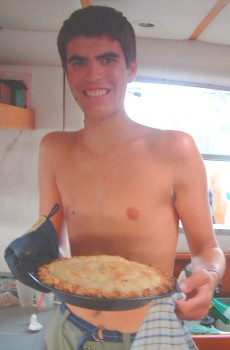 Chris bakes a superb pie with fresh apples from Ecuador |
Arthur kept us company on the helm seat for the whole 24 days, jumping down only for his litter box, sometimes for food, and when it got really calm, to wander the decks a bit.
I loved the days on the open water: the glorious slow dawns when the sea changed from black to gray to blue. And the sunsets with green flashes, gold and pink clouds. We were blessed with good weather, fair winds, and a well-found boat. The only real nautical surprise was the growth of several inches of goose-necked barnacles on the hull. We had to stop mid-ocean and scrape them off, wary of attracting sharks. The only thing that attacked us, though, was jelly fish tentacles. I emerged wrapped in a spiral of stings. Undiluted vinegar gave some relief, but the welts stayed for a day, and the scars for a week. We hadn't seen the jellies when we jumped in, but on other days we had looked overboard into a soup of tiny jellies.
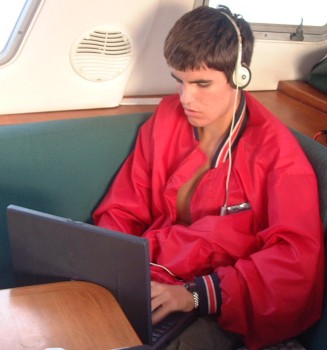 Radio e-mail is a wonderful gift for cruisers |
(Chris) Well, I certainly wasn't looking forward to the thought of this passage. Weeks at sea, no land in sight, night watches, electricity and water conservation, and so forth. In the end, however, it wasn't too bad. In fact , I think the most annoying thing was when the wind dropped to absolutely nothing and we ended up just drifting along at 1.5 knots or so. That was REALLY slow, and made for a long and boring passage. We could possibly have made the trip a week faster under the right wind conditions. Several other boats who left before us did quite well, shaving more than four days off our time, and many of those boats were normally slower than us! But we stayed a bit further north than most boats, to get a calmer and more comfortable ride, and the winds are lighter towards the equator.
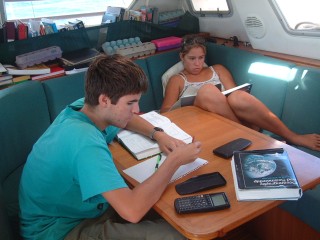 Even when we're sailing, school is in session. |
Life on passage isn't actually very difficult, just different. I probably rested at least two hours a day to make up for sleep lost while on night watch, and most of the rest of the time I did schoolwork. I actually accomplished quite a lot, which is good as I needed those days to keep up with my schedule. Other times I spent reading and playing chess (or other games that don't require electricity.)
I was very glad we had the SSB and radio e-mail to keep in touch while we sailed. Every morning there was a net where boats gave their positions, conditions, and other information about their passage. Near the middle of the day, Amanda and I would join a kids' net on the SSB to compare conditions, chat, and have a small quiz that different boats took turns creating.
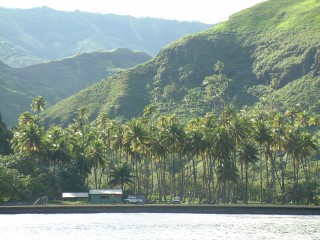 Ua Huka, Marquesas: A sight for very sore eyes |
In the evenings, we would tune into a Winlink e-mail station on the US west coast, Hawaii, or another place on the Pacific. We would then send and receive weather information, time-critical messages, and personal mail. Our conservation of electricity meant we could not spend a long time writing, but any communication with our friends back in the states was a wonderful gift.
Overall, aside from the slow speed and boring monotony, the passage to the Marquesas wasn't too bad. We caught several fish, and had no very bad weather. It was slow, but the seas were flat and the sky was clear.
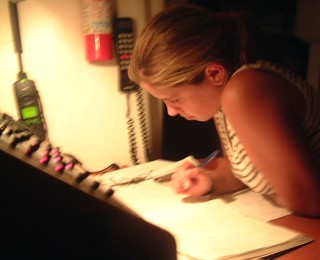 Amanda on night watch, making a log entry |
Even so, I was very glad to see Ua Huka. Aside from being solid ground, it was a beautiful island with a nice town and a decent anchorage. Unfortunately, we couldn't stay (we had to go to Ua Pou to check in.) We walked around the town, but didn't even stay 24 hours.
(Amanda) Before we got to Ecuador, I really wasn't looking forward to being on the boat for a month straight. Before the sail to Ecuador, the only multi-day sail we had was from Curaçao to the San Blas, and that really wasn't a nice sail. But after two more multi-days, and a month of dinking around in the Galapagos, I just wanted to go. Get it over with!
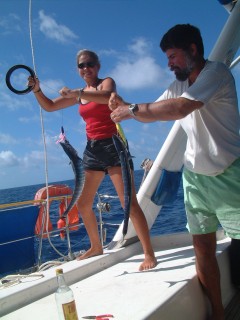 Amanda & Jon bring in 2 wahoo! |
But of course we spent an extra week or so vacuum packing everything perishable (DIE, weevils!) and letting everyone get mentally ready for not seeing land for twenty-odd days. But finally we were ready to go. So we went.
The first three days or so were a bit hectic, like they always are. But after that, we got into a nice rhythm. Otto von Helm (the autopilot) was going most of the time, so we only needed one person on watch at any time. I actually enjoyed sitting out at night, seeing the moon slowly wane, then wax. I even saw dolphins at night once, gleaming in the phosphorescence. It was magical.
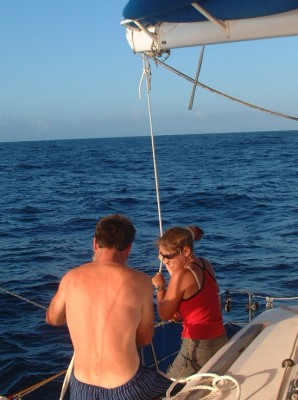 Jon and Amanda jury-rigging a jibe preventor |
I spent my days mostly inside, doing schoolwork, reading, playing my guitar, etc. Occasionally I would do something on the computer, when we had the engine on to charge the batteries (or actually go somewhere). But usually when the engine was on I'd pull out the sewing machine and work on the mosquito nets we were making for the Marquesas. We fished every day except for days when we had enough fish or meat that we had to eat. We didn't catch much, except a couple wahoo, a dorado, and I think maybe a tuna. We caught three wahoos, and it's weird - we caught two together, after about five days, at exactly the same time, and then a couple days later, a wahoo and the dorado. Dorados we expect to swim together, as they mate for life, but we've never caught two wahoos at once before.
Sailing slowly made for a couple luxuries, like putting a cup of water on the deck and not having it slammed off, or reading down in your cabin, but after a while it got tedious. I think we raised and lowered the mainsail about ten times on the passage, and the spinnaker about as many times. We did have a bit of excitement about halfway through the sail, when our vang jibe preventer chafed through, leaving the main slamming back and forth - luckily there was barely any wind, not enough to bring the mast down. We tied another rope to the end of the boom and cleated it off as a temporary vang, which we've kept attached just in case, but basically what Dad and I had to do was pull the rest of the vang, which we could only get at from one side, out of the boom, splice it back together, run a stiff wire down the boom, and re-string the vang. The seas were still big at this point, so it was rather exciting.
Despite the lovely laziness of sitting on the boat and doing nothing all day, I was happy to get to land. Almost all the people we had left with arrived before us, so they were all waiting for us. When we arrived, we had a big dinner ashore with everyone. And the Marquesas were truly magical.
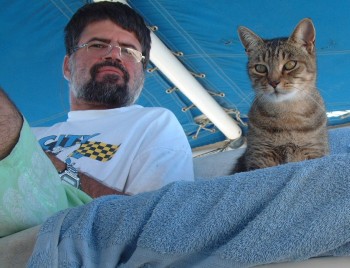 Arthur kept us company on the helm seat. |
(Jon) For such a long passage, this one was actually fairly pleasant. On most passages, it usually takes me a few days to get used to the motion of the boat, but since there was no wind near the Galapagos, our first few days were calm and the seas were flat. After that, the days just sort of melded together. By the end, we'd gotten into such a rhythm that it was almost anti-climactic to stop.
Being alone together on such a vast ocean was a wonderful time for reflection and quiet conversations. After a year on board, we've learned the importance of respecting each other, of not annoying each other, and of the value of personal space, so the close confines didn't cause the frictions that can sometimes develop.
But the vastness of the Pacific really struck me. I think we saw a total of 2 other ships during the entire month. The rest of the time, it was just a vast ocean, all the way around us, going on for miles and miles. To be sure, it had lots of different moods - each day was slightly different from the last, but it seemed like no matter how long we sailed, there was always more ocean. If we hadn't had our radio contacts twice a day (and email in the evening) we might have thought we were the only people on earth.
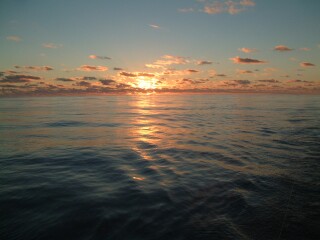 The sun greets another day on the vast Pacific Ocean |
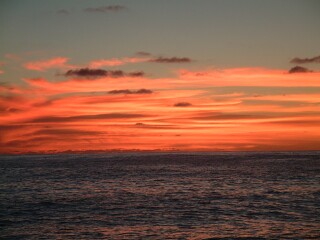 Sailing into yet another glorious South Pacific sunset |
Note: We will not include a log for this passage. For day-to-day information, please see the Newsletters pages.
Marquesas Newsletters | Tuamotus Newsletters | FP Flora & Fauna
Top Level: Home | Destinations | Cruising Info | Underwater | Boat Guests | Ocelot | Sue | Jon | Amanda | Chris | Site Map | Make a Comment
|
If our information is useful, you can help by making a donation |
Copyright © 2000‑ Contact: Jon and Sue Hacking -- HackingFamily.com, svOcelot.com. All rights reserved.